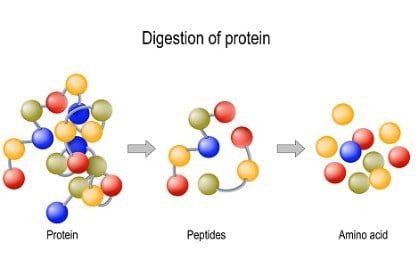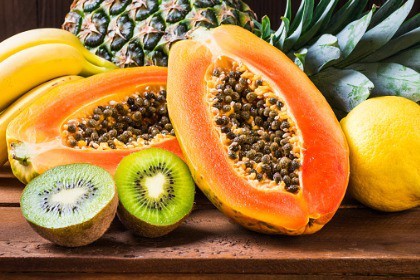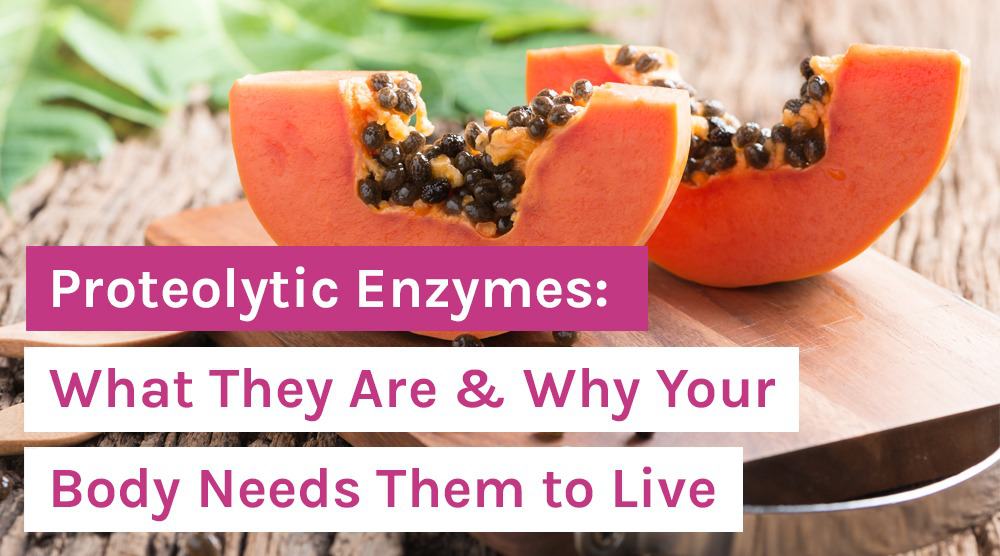Proteolytic Enzymes: What They Are & Why Your Body Needs Them to Live
In a hurry? Click here to read the Article Summary...
Imagine visiting a theme park. You would likely see employees carefully directing traffic in the parking lot, forming orderly ride queues inside the park, and ushering guests in and out of busy restaurants and food courts. Were these workers absent, mass chaos would surely ensue, and there would be a whole lot of unhappy ticket holders.
Now, consider how your body works. Though you can’t see them, tiny “workers” live inside your body that similarly help to digest your food, keep you protected against disease, give you energy, and perform other important tasks – all in an efficient, methodical fashion. These workers are known as proteolytic enzymes, and without them your body would quickly devolve into a ragtag cellular throng – a biological ship full of passengers without a captain.
What Are Proteolytic Enzymes and Why Do They Matter?
At a fundamental level, proteolytic enzymes are responsible for catalyzing the conversion of the foods you eat (i.e., breaking them down) into smaller molecules that your body can actually absorb and use.
In the case of food proteins, proteolytic enzymes break these proteins down into smaller peptides that your digestive system then converts into amino acids. Amino acids function not only as the basic building blocks of proteins but also muscle tissue, organs, and life itself [1].

Without proteolytic enzymes, in other words, your body’s “theme park” would not only succumb to biological pandemonium, but it would also very quickly die. That’s how important these microscopic supporters, maintainers, and rejuvenators are when it comes to keeping your body in tip-top shape, beginning with digestion.
How Does the Body Break Down Protein?
In order to digest protein, the stomach releases pepsin, a proteolytic enzyme in the gastric endopeptidase category. Pepsin “attacks” the proteins in your stomach to initiate the process of extracting their molecular components.
After this is complete, your small intestine finishes the job by instructing the pancreas to release another round of proteolytic enzymes that unpack all remaining molecules for assimilation throughout your body.
Your digestive tract as a whole is naturally equipped with two main types of proteolytic enzymes:
- Exopeptidases, which target the ends of proteins, and
- Endopeptidases like pepsin that target the insides of proteins
This one-two punch of complementary enzymes ensures that the base molecules of all proteins you ingest (as well as fats and carbohydrates) are fully extracted and absorbed into your body via the cellular lining of your intestines.
When proteolytic enzymes are in abundance, your body is able to derive maximum nourishment from the foods you eat. This is critical for maintaining your immune system. Proteolytic enzymes provide a steady supply of immuno-modulatory inputs that your immune system relies on for its efficacy and longevity.
Proteolytic Enzymes Are Vital for Healing
Besides optimizing digestion and nutrient absorption, proteolytic enzymes work to unlock your body’s full wellness potential by revving up its endogenous, or internal, healing mechanisms. (By the way, there are tens of thousands of unique varieties of proteolytic enzymes).

These systemic enzymes, as they’re commonly referred to in this context, help to fine-tune the body, and keep it humming like a well-oiled machine.
Modern advances in human genome sequencing have demonstrated that more than two percent of the human genetic blueprint is responsible for encoding these systemic enzymes. This is important because it suggests that systemic enzymes are responsible for a whole lot more than just turning what you eat into the nutrients you need to live.
We know, for instance, that systemic enzymes aid in the regulation of things like growth factors, cytokines, chemokines, and cellular receptors [2]. They also work to degrade various pathogenic (disease-causing) complexes that, if left to their own devices, would steadily chip away at your immune system, making your body more prone to disease.
Aging Impacts Inflammation-Modulating Proteolytic Enzymes
The human body is programmed to manufacture a steady supply of systemic enzymes. However, like with most things in life, its efficiency declines over time as a result of aging and other factors.

Enzyme stores begin to decline in tandem with the body needing more of them to get things done, which can eventually cascade like dominoes into systematic health failure – something none of us wants to experience!
One simple solution to help address this issue is to take in more enzymes. But what are the best sources of systemic, or proteolytic, enzymes?
The Best Proteolytic Enzymes in Food and Dietary Supplements
While many foods naturally contain enzymes, they often end up damaged or destroyed due to cooking or processing. Some people experience the negative effects of this as gas or bloating following a meal. Foods are not being properly digested, and thus cause stomach upset.
In the longer term, persistent enzyme deficiency can trigger even worse symptoms – think organ damage, nerve inflammation, and immune failure. This is what you want to avoid by fortifying your enzyme stores, which can be accomplished by consuming more whole, raw fruits & vegetables, which are among the richest natural sources of enzymes.

Leading the pack on this front are fruits like pineapple and papaya, both of which contain very high levels of pepsin. Other enzyme-rich foods include kiwifruit, ginger, and fermented foods such as sauerkraut, yogurt, and kefir.
There are also full-spectrum proteolytic enzyme supplements that can help fill the void when enzyme-rich foods are lacking or not an option. The best proteolytic enzymes supplements are those that contain many or all of the most critical enzymes necessary for digesting not just proteins, but also carbohydrates and fats.
These include, in each of these categories:
Proteins
Protease, sometimes described as the “Swiss Army knife” of human biology due to its incredible versatility, regulates most physiological processes inside the body. Often labeled using a number scale (i.e., 3.0, 4.5, and 6.0), proteases fragment long-chain amino acid sequences into customized smaller components that the body can use in a variety of applications. Protease also creates peptidase, which further aids in protein hydrolyzation [3].
Carbohydrates
Amylase converts starches into simple sugars. It is produced both in saliva and in the small intestine, breaking down polysaccharides, or complex carbohydrates, into maltose. Other enzymes then convert maltose into dual units of glucose that are easily absorbed into the bloodstream and sent throughout the body [4].
Fats

Lipase breaks down lipid fats into molecular fatty acids and glycerol that the body uses to reinforce cell membranes, promote cell growth, manufacture hormones, “warm” cell tissue, and produce energy [5].
Keep in mind that these three enzymes are considered to be primary in each of their respective categories. There are many other complementary enzymes that support these “big three,” including bromelain, lactase, cellulase, and phytase, all of which are linked to healthy digestion and improved nutrient absorption [6].
Proteolytic Enzymes, Inflammation, and Cancer: What Does Science Have to Say?
Proteolytic Enzymes and Inflammation
Any extrapolation of the systemic benefits of proteolytic enzymes would be woefully inadequate without mentioning inflammation. Proteolytic enzymes act as regulators of your body’s various inflammatory mechanisms, helping to modulate its inflammatory response and ensure that just the right amount of healthy inflammation gets to where it needs to go for routine maintenance.
Research has shown that proteolytic enzymes can also help to reduce pain, swelling, and bruising after surgery [7], aid with delayed-onset muscle soreness after exercise (DOMS) [8], and can even help with managing pain in patients with inflammatory conditions [9].

For example, a study published in the Journal of Clinical and Diagnostic Research in 2017 involved 30 patients with symptomatic Temporomandibular Joint Pain (TMJ) osteoarthritis. Researchers found the group receiving oral enzymes in addition to their Non-Steroidal Anti Inflammatory Drugs (NSAIDs) had better pain management than with the drug alone.
According to the researchers, “The trial showed significant improvement in reducing pain in patients treated with oral enzymes and diclofenac sodium combination therapy.”
Proteolytic Enzymes and Cancer
Macrophages are a type of white blood cell whose job is to “eat” harmful bacteria, viruses, fungi, and parasites. Proteolytic enzymes may help to boost the “appetite” of macrophages by as much as ten-fold.
Proteolytic enzymes may also enhance the potency of natural killer (NK) cells, a type of white blood cell that the immune system utilizes to fight things like virally infected cells and cancer tumors [10]. This, in turn, helps to balance the inflammatory mechanisms that, if left to their own devices, could turn rogue, potentially leading to serious health conditions like osteoarthritis or rheumatoid arthritis, systemic nerve damage, or organ failure.

Experimental investigations and relevant clinical cohort studies have also identified numerous potential benefits for the use of proteolytic enzymes in complementary oncology. Therapeutically speaking, proteolytic enzymes have been shown in both in vitro and in vivo clinical research to minimize the side effects associated with cancer and conventional cancer treatment protocols.
As noted in the journal Integrative Cancer Therapies, “These studies demonstrated that systemic enzyme therapy significantly decreased tumor-induced and therapy-induced side effects and complaints such as nausea, gastrointestinal complaints, fatigue, weight loss, and restlessness and obviously stabilized the quality of life.”
Some of the best proteolytic enzymes for addressing the root causes of cancer include:
- trypsin
- chymotrypsin
- papain
- bromelain
All of these proteolytic enzymes possess generalized immunological, anti-inflammatory, anti-infectious, antitumoral, and anti-metastatic properties that support a cancer-free lifestyle.
In patients with plasmacytoma (a type of cancer that starts in plasma cells and develops into a single tumor), proteolytic enzyme therapy was shown to help improve the overall effectiveness of the treatment process. It also helped to reduce the duration of remissions while boosting overall survival rates [12].
Proteolytic Enzymes Represent Life
In conclusion, proteolytic enzymes represent life. Our bodies would not survive without them. They’re essential for supporting pretty much everything we hold near and dear in terms of quality of life – so be sure you’re getting enough of them!
Organixx Enzyme 17 contains a whopping FIVE kinds of powerful protease enzymes in combination with one of the most advanced enzyme blends on the planet. It’s scientifically designed to help your body break down and process nutrients for better absorption, digestion, and overall health.

 Sources:
Sources:
Article Summary
Tiny “workers” live inside your body that help to digest your food, keep you protected against disease, give you energy, and perform other important tasks. These “workers” are proteolytic enzymes.
Proteolytic enzymes are responsible for catalyzing (breaking down) the foods you eat into smaller molecules that your body can actually absorb and use.
Protein is broken down into smaller peptides that your digestive system converts into amino acids. Amino acids are the basic building blocks of muscle tissue, organs, and life itself.
With enough proteolytic enzymes, your body is able to derive maximum nourishment from the foods you eat. This is critical for maintaining your immune system.
Proteolytic enzymes are also critical for your body’s internal healing mechanisms. In this context they’re referred to as systemic enzymes.
The body’s production of systemic enzymes declines over time as a result of aging and other factors. Persistent enzyme deficiency can trigger symptoms of gas or bloating or more serious issues such as organ damage, nerve inflammation, and immune failure.
You can fortify your enzyme stores by consuming more whole, raw fruits & vegetables, which are among the richest natural sources of enzymes. The other method is through supplementing with high-quality proteolytic enzymes such as P3E from Organixx.



What I despise is that you provide medical information???And you sell products for our Health. Are they safe like'' GMO'' free ,no Round Out no pesticide, no lead contamination, etc
Hi Horse with NOname, thank you for your feedback.
We would be very happy to address your concerns.
Please know, that we always try to provide very informative, helpful and honest content for our viewers. Our mission is to empower you organically.
Rest assured that all of our products do go through thorough microbiology, heavy metal, pesticide, and common allergen testing. They're tested to be free from GMOs, heavy metals, pesticides, herbicides, antibiotics, molds, e-Coli, salmonella, and other environmental toxins and we are very satisfied that those results line up with or exceed the organic standards.
If you would like to learn more about our company, our products and the mission that drives us, we encourage you to check out the following links below:
About us: https://ox2022.organixx.com/about-us/
Organixx Website: https://shop.organixx.com/
FAQ's: https://support.ox2022.organixx.com/
We hope you find this helpful and wish you a lovely evening!
Taken w/food for digestion but taken away from food for all other 'clean up' benefits, right?
Hi Jacquie, thank you for your comment.
Our P3E supplement helps to improve digestive balance. Taking Organixx P3E Advanced Enzyme Formula with every meal will give you the powerful support your body needs to take on all the modern-day food issues you might encounter.
Our suggested dosage is for adults to take 3 capsules with each meal daily. However, you may want to consult with your healthcare professional for your own personal use of the product.
For more information, feel free to check out the following links below:
P3E Product Label: https://ox2022.organixx.com/wp-content/uploads/2020/01/p3e-back-label.png
P3E Shop Page: https://shop.organixx.com/products/p3e
P3E Product Details: https://ox2022.organixx.com/p3e
Thank you so much for being here with us. We hope you have a wonderful day!
Can you please describe how P3E is different (or better) than Organizymes? I've been using Organizymes for almost a year and was going to reorder....should I be taking P3E instead?
Hi Karen, thank you for your question. We'd be more than happy to address your concern.
Our P3E is replacing OrganiZymes. P3E is a digestive Enzyme as well as a proteolytic Enzyme. This means it will help to aid digestion as well as help to break down proteins.
If you would like to learn more about the most advanced proteolytic + full-spectrum enzyme supplement on the market, we encourage you to check out the following links:
P3E Shop Page: https://shop.organixx.com/products/p3e
P3E Product Details: https://ox2022.organixx.com/p3e
We hope this helps and wish you a wonderful evening!!
You reference a study that showed a 66% increase in nutrient uptake. Will you provide a link to that study? Who performed the study? Are they published?
Hi Deborah, thank you for your question.
Unfortunately, we are not able to locate the text regarding the 66% increase in nutrient uptake in this article that you are referring to.
However, please feel free to scroll down to the end of the post and click the down arrow button beside "Sources" (above the Article Summary) to show all of the links of the sources we used as a reference for this article.
We hope this helps!